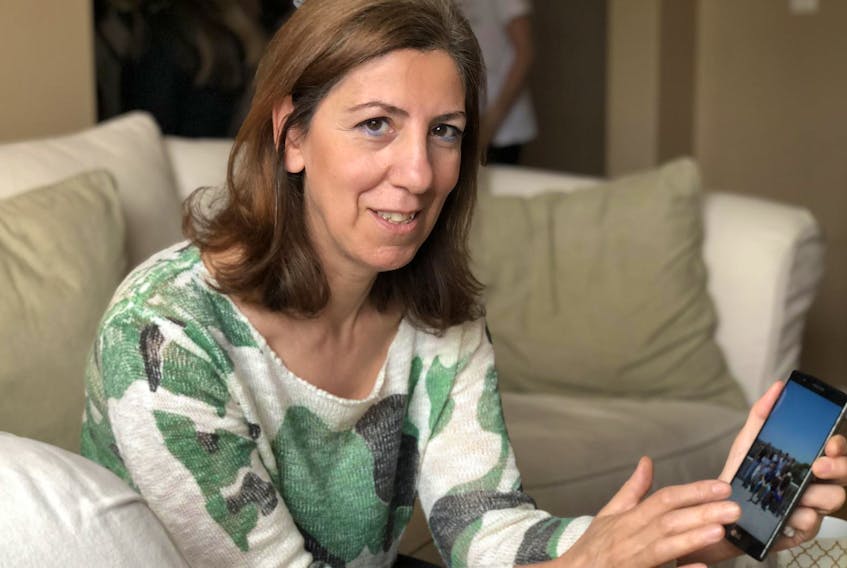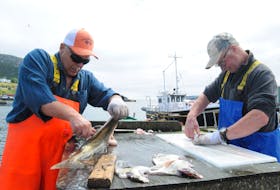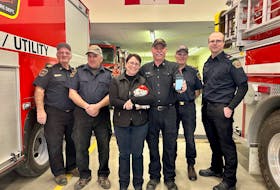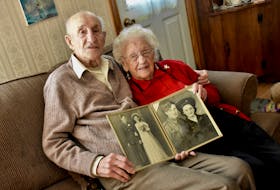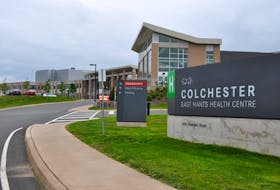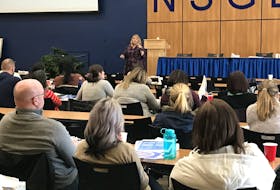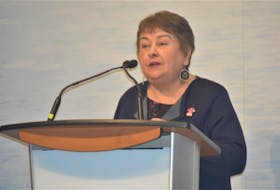Refugees come from war-torn countries with horrific memories and maybe injuries, including a Syrian woman, who came to Nova Scotia from Aleppo with a bullet in her neck.
Tiriz Kerbag, who lives with her husband and her two sons in Dartmouth, works about 30 hours a week at Sobeys despite the pain that hits her from time to time.
“‘It’s a miracle. You are lucky,’ every doctor saw me said that,” Kerbag said.
The mother of two has an AK-47 bullet located in her neck between two blood vessels — one goes to the brain and the other goes to the lower jaw, she said.
On Valentine’s Day six years ago, Kerbag was walking in downtown Aleppo with her son Mario Kalzi, who was 14 years old at that time. “I felt like a huge stone hit the back of my head,” she said. “I fell down while holding my son’s hand.”
Two men walking on the street came to help. “First, they said they couldn’t see anything. Then one said there is a wound on the top back of my head,” Kerbag said. She wasn’t bleeding too much. And although she lost her balance and felt unbearable pain, she stayed conscious.
“I was praying,” she said. “I didn’t want to die on street.”

“Everyone in the hospital came to see the woman who got shot and didn’t bleed,”
- Tiriz Kerbag
During the war, the emergency service in Syria became unreliable. “I asked Mario to call his uncle who lives close by to bring the car and take me to the hospital,” she said. The son did so, and the uncle showed up a few minutes later.
Back then, the fighting between the Syrian regime and the rebels was ongoing almost 24 hours a day in the country’s second largest city.
When her brother showed up, Kerbag was standing on her feet but her face was very red and she couldn’t feel the left half of her body. “I couldn’t tell what’s hurting me the most.”
“When we got to the hospital, they took an X-ray photo,” she said. “‘A bullet,’ I heard the doctor saying to my brother.”
Hospitals in Aleppo have worked for years in very difficult circumstances with a lack of blood components, medical supplies and long hours of power outages. “Everyone in the hospital came to see the woman who got shot and didn’t bleed,” she said.
“They did nothing other than watching,” she said. “When a nurse came into my room, I asked him for a pain-killer.”
The doctors at the hospital decided not to touch the bullet after doing further examinations. “If you want her to live, leave the bullet where it is,” she said, stating what the doctors told her husband and brother.
The next day, a group of 14 doctors met to discuss her case, and they all but one recommended not touching the bullet, the woman’s husband Raymond Kalzi, who attended the meeting, said. They kept her at the hospital for three days.
“When they put (an endoscope) inside my body, it was more painful than when I got the bullet,”
- Tiriz Kerbag
Her son, Mario Kalzi, didn’t walk with his mother on Aleppo streets after the injury. “I was afraid to walk with her,” the son said. “I had feeling in my heart. I didn’t want to walk with her outside anymore in Syria.”
The family landed in Canada almost three years ago and have lived in Halifax and Dartmouth since then.
When Kerbag went to the hospital here “they wrote that I’m refugee. Otherwise, the police would open an investigation about the bullet in my body.”
Doctors also said they needed an endoscopic view of Kerbag’s blood vessels. “When they put that thing inside my body, it was more painful than when I got the bullet,” she said. “I couldn’t move for a week.”
They came to the same conclusion as Syrian doctors. “It’s better to keep it where it is,” Kerbag. “A surgery to take the bullet out would be too risky and harmful. … They’re afraid of moving it.”
A couple of weeks after landing in Canada, Kerbag started going to English classes until she got hired at a Dartmouth Sobeys store. “I work in the deli section,” she said. “I clean the chicken, put it in the oven, then putting in its place so the customers see it.”
Her husband works as a cook in a restaurant on Robie Street and her oldest son Habib works for Royal Bank of Canada. Mario is studying business hospitality at Nova Scotia Community College and he’s doing his co-op in a restaurant on the waterfront.
The trauma that he lived through after his mother got shot seems to have faded after moving to Nova Scotia. “Here, I go out with her. We drive. We walk. It’s a peaceful life here.” Mario said.

